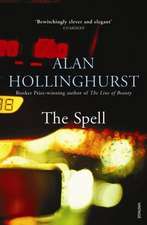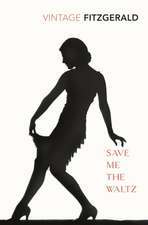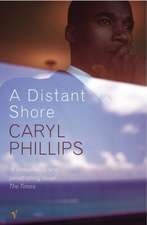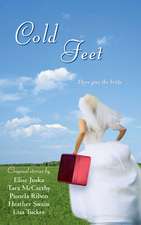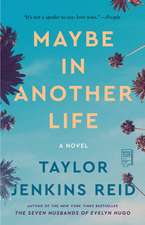The Winters in Bloom: A Novel
Autor Lisa Tuckeren Limba Engleză Paperback – 4 iun 2012
Everyone who knows Kyra and David Winter considers them over-protective parents, but the Winters have good reasons for fearing the worst. When the best thing about their lives—their beloved son, Michael— disappears from his own backyard one perfectly average summer day, the question is, whose past has finally caught up with them?
In the search for young Michael, Kyra and David will be forced to reveal secrets about themselves they’ve always kept hidden, but they will also discover that it’s not too late to have the sort of family they’ve always dreamed of. Lyrical and wise, Lisa Tucker’s enchanting, life-affirming novel will surprise readers and leave them full of wonder at the stubborn strength of the human heart.
Preț: 112.47 lei
Nou
Puncte Express: 169
Preț estimativ în valută:
21.52€ • 23.37$ • 18.08£
21.52€ • 23.37$ • 18.08£
Carte disponibilă
Livrare economică 01-15 aprilie
Preluare comenzi: 021 569.72.76
Specificații
ISBN-13: 9781416575412
ISBN-10: 1416575413
Pagini: 304
Dimensiuni: 135 x 210 x 20 mm
Greutate: 0.25 kg
Editura: Washington Square Press
Colecția Washington Square Press
ISBN-10: 1416575413
Pagini: 304
Dimensiuni: 135 x 210 x 20 mm
Greutate: 0.25 kg
Editura: Washington Square Press
Colecția Washington Square Press
Notă biografică
Lisa Tucker is the bestselling author of The Promised World, The Cure for Modern Life, Once Upon a Day, Shout Down the Moon, and The Song Reader. Her short work has appeared in The New York Times, The Oxford American, and the Three Books series on NPR. She lives in Philadelphia.
Extras
Chapter One
He was the only child in a house full of doubt. In bed each night, though it wasn’t dark—the floor lights his father had installed—and it wasn’t entirely private—the nursery monitor both parents refused to give up—he rehearsed the things he was certain of, using his fingers to number them. He was just a little boy, but he wouldn’t allow himself to sleep until he’d gone through both hands twice. Twenty was a good number, he thought, though of course it paled in comparison with the number of doubts, partly because his parents had had so many years to discover them, but mainly because the doubt list was always growing, towering above him like the giant boy at his old school, the one his father had called a bully. The giant boy, whose name was Paul, had never done anything to Michael, but his parents doubted that Michael could learn in such an environment and took him out of that school. The three schools that followed had led to three other doubts, and now Michael was finishing first grade in home school, even though homeschooling had its doubts, too. I doubt he’ll get the socialization he needs, his mother said. I doubt we can teach him laboratory science, his father said, but we’ll have to deal with that when the time comes. And then the words his parents didn’t have to say—if the time comes—because the future was always the biggest doubt of all.
“I will get bigger.” Michael whispered it every night, holding up his thumb. Then he said, touching his index finger, “I will not die before I get to drive a car.” He would force himself not to think of all the ways he could die, the hundreds of things his parents had told him all his life. He would also force himself not to daydream about what his first car would be like, because then he would fall asleep before he finished his counting and dream about rows and rows of shiny cars, all with headlights that looked like eyes and grills that looked like mouths.
In the morning, he was often very tired. When he slumped down for breakfast, his mother would put her hand on his forehead and ask if he was feeling okay. He hardly ever got sick, except when he was two years old and then he was so sick he had to spend weeks in the hospital, though all he remembered about that now was the pattern of elephants and monkeys on the nurses’ clothes. His mother always made him touch his chin to his chest, even if he told her his neck didn’t hurt. Sometimes she would take his temperature and inspect his throat and ears with a flashlight and push on his belly to make sure his appendix wasn’t about to burst. Only after she was satisfied that he wasn’t coming down with something would she ask, “Did you have any nightmares?”
He used to tell her, but he’d stopped when he realized that she and his father discussed his dreams the same way they discussed all the books they were reading about Raising Your Gifted Child. So he didn’t tell her about the dream he kept having where the ocean came up to his bedroom window and he jumped in a boat and floated off. He only thought of it as a nightmare because he knew it should have been scary—if he was alone in the boat, this meant his parents must have drowned. In real life, he would have cried and cried for his parents: their love for him was one of the things he was most certain of; it was always somewhere in the first five things he counted every night. But in the dream, it never occurred to him to wonder where they were. He was sitting on a flat wooden seat in the middle of the boat, listening to the sound of the water lapping against the sides, blinking at the sun hanging so low in the sky it looked like he could row right to it. He felt like the biggest, scariest parts of the world were all gone, washed away by something that was winking at him in the soft fat cloud that floated overhead.
The lady who appeared that day was like the cloud, though she wasn’t fat and she wasn’t at all soft. Her arms were so skinny that when she bent her elbows, Michael thought of the paper clips he liked to twist apart when he was supposed to be learning geography. He didn’t really like geography, though he loved the maps hung up in the room where he studied—the schoolroom, his parents called it, though it was nothing like school, because there was only one desk. The map of the city was right in front of him, and he’d stared at it so many times that he knew the lady wasn’t lying when she said she was taking him to the ocean. He’d always wanted to go there, but his father said a jellyfish might bite him, or he might swallow a mouthful of dirty, germy sand, or, worst of all, a tide current might pull him out to the sea and he would never, ever come back.
The lady had asked him where he wanted to go more than anywhere in the world. She was so nice to him that he felt like it might be true when she said she loved him, even though he’d never seen her in his life until that morning. He was outside the house, in the backyard. It was the second day of the outside alone half hour, which his mother had decided he needed after she read a book about letting kids be free range, like the good-for-you kind of chicken. Michael didn’t know what to do outside—his mother had told him to go ahead and do whatever he wanted, but he was afraid to touch anything, because dirt on your hands could make worms grow in your stomach, and he knew he should never climb a tree, he could fall and break his neck—so he walked around in circles and waved back each time his mother waved at him. She could see him perfectly while she did the dishes. So she must have seen the lady, and it must have been okay for him to go with her, like the lady said. It’s a surprise! Like on your birthday, except better!
He knew he wasn’t supposed to even talk to strangers, but the lady said she wasn’t a stranger. You’re my little buddy, the lady said, and she was crying, which made Michael feel bad for her. She was so skinny and sad, but in her car, she had lots of toys, just like she promised. She had toys he’d always wanted to play with, like robots with little parts that could break off and choke him, and bright red and blue and yellow cars that were probably made with lead paint. He was afraid to touch the toys at first, but then he decided that he wouldn’t choke or swallow lead paint unless the toy went in his mouth. And why would the toy go in his mouth, when it was so much more fun to move the robot arms and pretend the cars were zooming up and down his legs, like the lady’s car was zooming up the highway?
He might have had trouble believing that his parents had agreed to let the lady take him somewhere if he hadn’t overheard them just last night, talking about how they had to change. It can’t be good for him to be trapped in the house all summer. Other children are out of school, going to camp, playing with their friends. The two of us are doing our best, but it’s not enough. He needs more people in his life.
His mother was the one who’d talked the most, but his father had made noises that sounded like agreement. So this trip with the lady that his parents had planned must be like the time they replaced the entire heating system in the house, rather than trying to get the old one fixed. Sometimes you have to take extreme measures, his father had said, and then he’d explained that an extreme measure was necessary when the problem was so big, the only way to deal with it was to give up on what you’d done before and start over from square one.
Being with this lady, sitting in a regular seat in the back of her car belted in with a regular seat belt, next to another seat covered with dangerous toys he’d taken out of a dangerous plastic bag, on the way to the ocean, was definitely an extreme measure. On some level Michael felt this, but most of him was just excited. The lady was happy now, too; her laughs sounded like Christmas bells. She had a really friendly smile and nice straight teeth, but when she pushed her hair back, he noticed a big scar on her wrist, and he wondered if it hurt sometimes, the way Mommy’s scar on her knee did whenever it rained.
If they talked about anything important on the way to the Jersey Shore, Michael didn’t remember it. What he remembered—and would for the rest of his life—was that afternoon on the boat. It wasn’t a rowboat like in his dream; it was a big fishing boat with an upper deck and a lower deck and lots and lots of people. Michael was on the upper deck looking out at the wavy sea when a giant fish jumped straight out of the ocean and landed with a huge splash. It was a humpback whale, the fisherman announced, and everybody on the boat was pointing and talking when the whale jumped up again! It did it seven times, which Michael heard people say was amazing, because a lot of times these whale-watching boats went out for hours and didn’t see anything.
It’s because we’re lucky, the lady said. She pointed at the whale’s tail, which seemed to be waving before it disappeared back into the water. It likes you.
Michael closed his eyes tight, but when he opened them it was all still there: the bright blue sky and the soft pillow clouds and the endless ocean lapping at the sides of the boat. His hand was still tucked in the lady’s bony hand, and the boat hadn’t tipped over and the seagulls hadn’t pecked his eyes out and the big scary fish wasn’t really scary at all.
“It likes me,” Michael whispered; then he grinned as big as he could, in case the whale was looking up at him through the water. In case the whale was like the lady, who’d promised when she appeared in his backyard that all she wanted was to be Michael’s friend, more than anything in the world.
He was the only child in a house full of doubt. In bed each night, though it wasn’t dark—the floor lights his father had installed—and it wasn’t entirely private—the nursery monitor both parents refused to give up—he rehearsed the things he was certain of, using his fingers to number them. He was just a little boy, but he wouldn’t allow himself to sleep until he’d gone through both hands twice. Twenty was a good number, he thought, though of course it paled in comparison with the number of doubts, partly because his parents had had so many years to discover them, but mainly because the doubt list was always growing, towering above him like the giant boy at his old school, the one his father had called a bully. The giant boy, whose name was Paul, had never done anything to Michael, but his parents doubted that Michael could learn in such an environment and took him out of that school. The three schools that followed had led to three other doubts, and now Michael was finishing first grade in home school, even though homeschooling had its doubts, too. I doubt he’ll get the socialization he needs, his mother said. I doubt we can teach him laboratory science, his father said, but we’ll have to deal with that when the time comes. And then the words his parents didn’t have to say—if the time comes—because the future was always the biggest doubt of all.
“I will get bigger.” Michael whispered it every night, holding up his thumb. Then he said, touching his index finger, “I will not die before I get to drive a car.” He would force himself not to think of all the ways he could die, the hundreds of things his parents had told him all his life. He would also force himself not to daydream about what his first car would be like, because then he would fall asleep before he finished his counting and dream about rows and rows of shiny cars, all with headlights that looked like eyes and grills that looked like mouths.
In the morning, he was often very tired. When he slumped down for breakfast, his mother would put her hand on his forehead and ask if he was feeling okay. He hardly ever got sick, except when he was two years old and then he was so sick he had to spend weeks in the hospital, though all he remembered about that now was the pattern of elephants and monkeys on the nurses’ clothes. His mother always made him touch his chin to his chest, even if he told her his neck didn’t hurt. Sometimes she would take his temperature and inspect his throat and ears with a flashlight and push on his belly to make sure his appendix wasn’t about to burst. Only after she was satisfied that he wasn’t coming down with something would she ask, “Did you have any nightmares?”
He used to tell her, but he’d stopped when he realized that she and his father discussed his dreams the same way they discussed all the books they were reading about Raising Your Gifted Child. So he didn’t tell her about the dream he kept having where the ocean came up to his bedroom window and he jumped in a boat and floated off. He only thought of it as a nightmare because he knew it should have been scary—if he was alone in the boat, this meant his parents must have drowned. In real life, he would have cried and cried for his parents: their love for him was one of the things he was most certain of; it was always somewhere in the first five things he counted every night. But in the dream, it never occurred to him to wonder where they were. He was sitting on a flat wooden seat in the middle of the boat, listening to the sound of the water lapping against the sides, blinking at the sun hanging so low in the sky it looked like he could row right to it. He felt like the biggest, scariest parts of the world were all gone, washed away by something that was winking at him in the soft fat cloud that floated overhead.
The lady who appeared that day was like the cloud, though she wasn’t fat and she wasn’t at all soft. Her arms were so skinny that when she bent her elbows, Michael thought of the paper clips he liked to twist apart when he was supposed to be learning geography. He didn’t really like geography, though he loved the maps hung up in the room where he studied—the schoolroom, his parents called it, though it was nothing like school, because there was only one desk. The map of the city was right in front of him, and he’d stared at it so many times that he knew the lady wasn’t lying when she said she was taking him to the ocean. He’d always wanted to go there, but his father said a jellyfish might bite him, or he might swallow a mouthful of dirty, germy sand, or, worst of all, a tide current might pull him out to the sea and he would never, ever come back.
The lady had asked him where he wanted to go more than anywhere in the world. She was so nice to him that he felt like it might be true when she said she loved him, even though he’d never seen her in his life until that morning. He was outside the house, in the backyard. It was the second day of the outside alone half hour, which his mother had decided he needed after she read a book about letting kids be free range, like the good-for-you kind of chicken. Michael didn’t know what to do outside—his mother had told him to go ahead and do whatever he wanted, but he was afraid to touch anything, because dirt on your hands could make worms grow in your stomach, and he knew he should never climb a tree, he could fall and break his neck—so he walked around in circles and waved back each time his mother waved at him. She could see him perfectly while she did the dishes. So she must have seen the lady, and it must have been okay for him to go with her, like the lady said. It’s a surprise! Like on your birthday, except better!
He knew he wasn’t supposed to even talk to strangers, but the lady said she wasn’t a stranger. You’re my little buddy, the lady said, and she was crying, which made Michael feel bad for her. She was so skinny and sad, but in her car, she had lots of toys, just like she promised. She had toys he’d always wanted to play with, like robots with little parts that could break off and choke him, and bright red and blue and yellow cars that were probably made with lead paint. He was afraid to touch the toys at first, but then he decided that he wouldn’t choke or swallow lead paint unless the toy went in his mouth. And why would the toy go in his mouth, when it was so much more fun to move the robot arms and pretend the cars were zooming up and down his legs, like the lady’s car was zooming up the highway?
He might have had trouble believing that his parents had agreed to let the lady take him somewhere if he hadn’t overheard them just last night, talking about how they had to change. It can’t be good for him to be trapped in the house all summer. Other children are out of school, going to camp, playing with their friends. The two of us are doing our best, but it’s not enough. He needs more people in his life.
His mother was the one who’d talked the most, but his father had made noises that sounded like agreement. So this trip with the lady that his parents had planned must be like the time they replaced the entire heating system in the house, rather than trying to get the old one fixed. Sometimes you have to take extreme measures, his father had said, and then he’d explained that an extreme measure was necessary when the problem was so big, the only way to deal with it was to give up on what you’d done before and start over from square one.
Being with this lady, sitting in a regular seat in the back of her car belted in with a regular seat belt, next to another seat covered with dangerous toys he’d taken out of a dangerous plastic bag, on the way to the ocean, was definitely an extreme measure. On some level Michael felt this, but most of him was just excited. The lady was happy now, too; her laughs sounded like Christmas bells. She had a really friendly smile and nice straight teeth, but when she pushed her hair back, he noticed a big scar on her wrist, and he wondered if it hurt sometimes, the way Mommy’s scar on her knee did whenever it rained.
If they talked about anything important on the way to the Jersey Shore, Michael didn’t remember it. What he remembered—and would for the rest of his life—was that afternoon on the boat. It wasn’t a rowboat like in his dream; it was a big fishing boat with an upper deck and a lower deck and lots and lots of people. Michael was on the upper deck looking out at the wavy sea when a giant fish jumped straight out of the ocean and landed with a huge splash. It was a humpback whale, the fisherman announced, and everybody on the boat was pointing and talking when the whale jumped up again! It did it seven times, which Michael heard people say was amazing, because a lot of times these whale-watching boats went out for hours and didn’t see anything.
It’s because we’re lucky, the lady said. She pointed at the whale’s tail, which seemed to be waving before it disappeared back into the water. It likes you.
Michael closed his eyes tight, but when he opened them it was all still there: the bright blue sky and the soft pillow clouds and the endless ocean lapping at the sides of the boat. His hand was still tucked in the lady’s bony hand, and the boat hadn’t tipped over and the seagulls hadn’t pecked his eyes out and the big scary fish wasn’t really scary at all.
“It likes me,” Michael whispered; then he grinned as big as he could, in case the whale was looking up at him through the water. In case the whale was like the lady, who’d promised when she appeared in his backyard that all she wanted was to be Michael’s friend, more than anything in the world.

